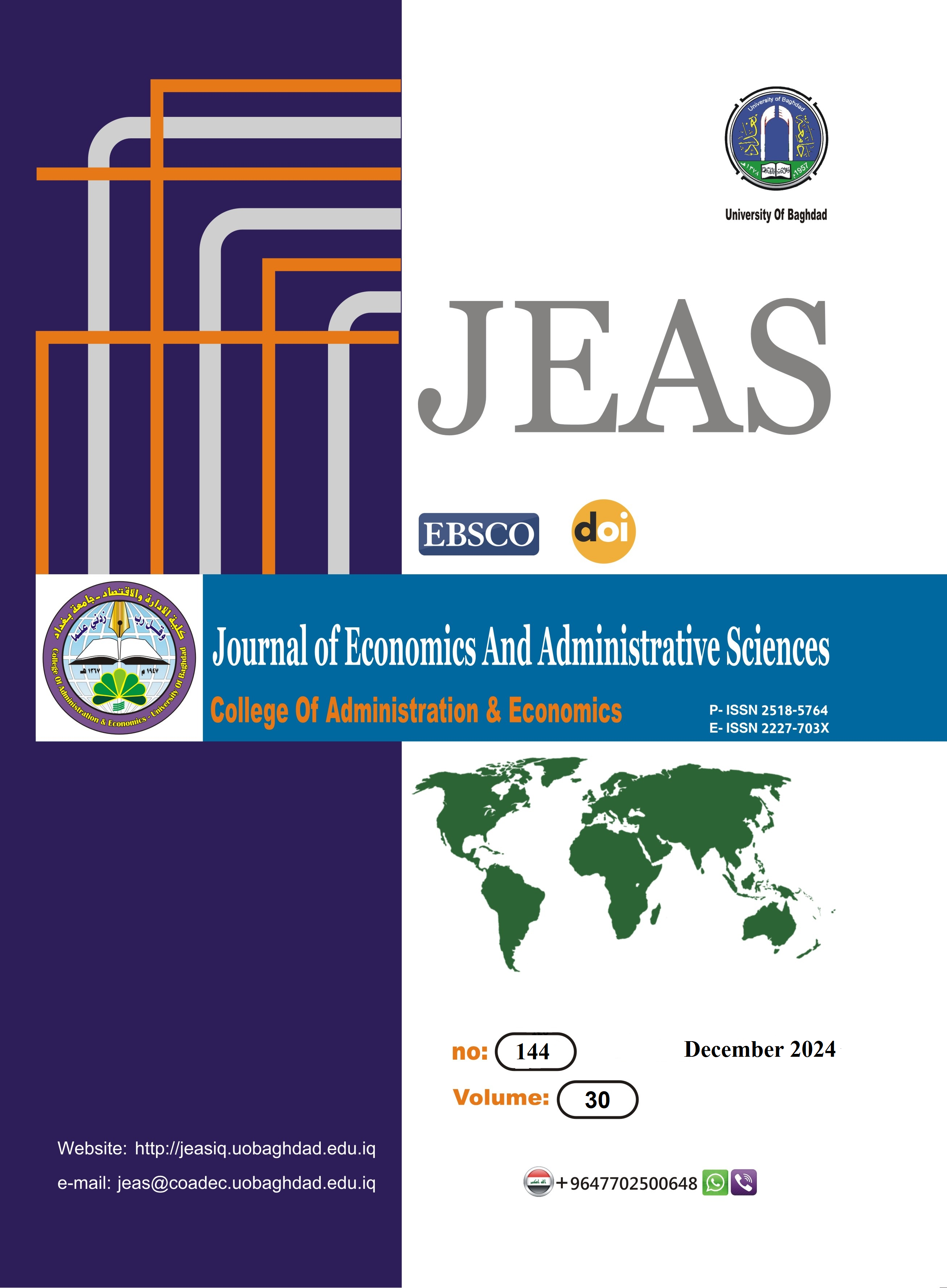Developing the Quality of Work Life in Light of the Relationship Between Organizational Ignorance and Job Conflict: an Exploratory Study of the Opinions of a Sample of Nurses in the Medical City Hospital
DOI:
https://doi.org/10.33095/dmx7yg36Abstract
Purpose: Developing the quality of work life as a logical indicator for studying the relationship between practical organizational ignorance and its influential role in determining organizational conflict for nurses at Medical City Hospital.
Theoretical framework: The study shed light on enhancing the organization's organizational ignorance according to the available data and information, and to the researcher's knowledge, other researchers have yet to address it.
Design/methodology/approach: The exploratory approach was adopted in presenting and measuring the concepts of organizational ignorance and functional conflict based on the questionnaire because it was applied in its quantitative form through standard models and applied at the level of the Medical City Hospital in Baghdad. A research population of the Medical City Complex was taken, and a sample of nurses was selected to become (85) individuals, excluding two individuals due to the lack of a complete answer, so that the sample for analysis became (83) nurses only.
Findings: Organizational ignorance has a distinct role in determining organizational conflict in overt, perceived, and implicit conflict related to implementing the strategy and developing the quality of work life in the Medical City.
Research, Practical & Social implications: An intellectual presentation perspective on organizational ignorance and its few dimensions in job conflict using thoughtful methods.
Originality/value: The research topic was applied to the Medical City Hospital in Baghdad, which is considered an essential institution in Iraq due to its unique organization and orientation, increasing the study's credibility and importance to society.
Downloads
References
Al-Ani, A. A. M. (2021). Organizational ignorance in educational institutions, causes and treatments. Al-Muthanna Journal of Administrative and Economic Sciences.
Al-Hasnawi, N. D. (2010). Factors of organizational conflict and its management strategies and their impact on strategic performance - an exploratory study in public and private hospitals. [Master’s Thesis]. University of Karbala.
Al-Shamaa, K. M. H., & Hammoud, K. K. (2007). Organization Theory (third edition). Dar Al-Masirah for Publishing and Distribution.
Campos, M. I. de, & Rueda, F. J. M. (2017). Effects of Organizational Values on Quality of Work Life. Paidéia (Ribeirão Preto), 27(67), 65–75.
https://doi.org/10.1590/1982-43272767201708
Dalkir, K. (2013). Knowledge Management in Theory and Practice. Routledge.
https://doi.org/10.4324/9780080547367
Delhey, J., & Dragolov, G. (2014). Why Inequality Makes Europeans Less Happy: The Role of Distrust, Status Anxiety, and Perceived Conflict. European Sociological Review, 30(2), 151–165. https://doi.org/10.1093/esr/jct033
Donald H. Rumsfeld. (2002). U.S. Department of Defense, Secretary of Defense Rumsfeld, 2002: 1. Https://Library.Rumsfeld.Com/Doclib/Sp/2477/2002-01-02%20to%20Deputy%20Secretary%20of%20Defense%20et%20al%20re%20Missile%20Defense%20Program%20Direction%20with%20Attachments.Pdf.
Dorniok, D. (2013). What is ignorance : a chronological overview of the discourse on ignorance in a historical context. xxx. (Unpublished).
Egbu, J. U. (2013). A Framework For Improving Knowledge Sharing In The Provision Of Floating Support Services In Sheltered Housing For The Elderly [Doctor Thesis]. University Of Sanford Manchester.
Gilaninia, S., Alipour, H., & Deldar, K. (2013). Customer Relationship Management and Its Relationship to Quality Of Work Life In The Social Organization Of Guilan. Arabian Journal of Business and Management Review, 3(3), 1–38.
Gross, M. (2010). Ignorance and surprise: Science, society, and ecological design. . M.I.T. Press.
Idowu, S. A., Ifedayo, T. E., & Idowu, E. O. (2020). Assessing the Career Conflict Options of Senior Secondary School Students of Ado-Odo Ota Local Government, Ogun State, Nigeria. Research in Social Sciences and Technology, 5(3), 55–77. https://doi.org/10.46303/ressat.05.03.3
Jalonen, H. (2024). Ignorance in organisations–a systematic literature review. Management Review Quarterly, 74(2), 909-950. https://doi.org/10.1007/s11301-023-00321-z
Kundi, Y. M., & Badar, K. (2021). Interpersonal conflict and counterproductive work behavior: the moderating roles of emotional intelligence and gender. International Journal of Conflict Management, 32(3), 514–534. https://doi.org/10.1108/IJCMA-10-2020-0179
Lange, A.-C. (2016). Organizational ignorance: an ethnographic study of high-frequency trading. Economy and Society, 45(2), 230–250.
https://doi.org/10.1080/03085147.2016.1220665
Madi, K. I. (2014). Quality of work life and its impact on the level of job performance of employees, an applied study on Palestinian universities [Doctorate thesis]. Faculty of Commerce, Suez Canal University.
Mahdi, H. H. (2019). “Adopting treatments for cognitive ignorance in achieving strategic superiority. [Master’s thesis]. Al-Mustansiriya University.
Mohammadi, S., Kiumarsi, S., Hashemi, S., & Niksima, B. (2016). An investigation of influential factors on the quality of work life and its relationship with employee performance: A case study in Iran. IOSR Journal of Humanities and Social Science (IOSR-JHSS), 21(2), 73–78.
Moore, W. E., & Tumin, M. M. (1949). Some social functions of ignorance. American Sociological Review, 14(6), 787–795.
Nurcholidah, L., Haryono, T., Sunaryo, S., & Hendarsjah, H. (2023). Work Family Conflict, Job Stress and Employee Engagement on Innovation Work Behavior: Mediating Roles of Career Adaptability. Journal of Law and Sustainable Development, 11(5), e1005. https://doi.org/10.55908/sdgs.v11i5.1005
Roberts, J. (2009). From knowledge management to ignorance management. In International Conference on Organizational Learning, Knowledge and Capabilities (Pp. 26-28)., 26–28.
Roberts, J. (2013). Organizational ignorance: Towards a managerial perspective on the unknown. Management Learning, 44(3), 215–236.
Published
Issue
Section
License
Copyright (c) 2024 Journal of Economics and Administrative Sciences

This work is licensed under a Creative Commons Attribution-NonCommercial-NoDerivatives 4.0 International License.
Articles submitted to the journal should not have been published before in their current or substantially similar form or be under consideration for publication with another journal. Please see JEAS originality guidelines for details. Use this in conjunction with the points below about references, before submission i.e. always attribute clearly using either indented text or quote marks as well as making use of the preferred Harvard style of formatting. Authors submitting articles for publication warrant that the work is not an infringement of any existing copyright and will indemnify the publisher against any breach of such warranty. For ease of dissemination and to ensure proper policing of use, papers and contributions become the legal copyright of the publisher unless otherwise agreed.
The editor may make use of Turtitin software for checking the originality of submissions received.

























